Hi FACNM Members,
Spring is windy in New Mexico. Be sure to check for red flag warnings before you burn debris or operate equipment that may create sparks. Red Flag warnings mean that warm temperatures, low humidities, and stronger winds are expected to combine to produce an increased risk of fire danger. There are currently red flag warnings across most of New Mexico.
This Wildfire Wednesdays features:
A webinar about insurance industry professionals and wildfire mitigation
Using Soil Moisture Information to Better Understand and Predict Wildfire Danger
Best,
Gabe
Insurance Industry and Wildfire Mitigation
This panel discussion, followed by a public Q&A, covers how we can better align the efforts of community leaders and insurance providers in promoting and expanding wildfire risk reduction efforts.
Carole Walker of the Rocky Mountain Insurance Information Association moderated the panel, which featured Nicole Mahrt-Ganley of American Property Casualty Insurance Association, Daniel Gorham of IBHS, and Jason Fehr of Chubb Insurance. The panel was hosted by Fire Adapted Montana Learning Network and Missoula County Office of Emergency Management, and was made possible with funding provided by the Fire Adapted Communities Learning Network.
For more information, and to view the recording, please click here.
Using Soil Moisture Information to Better Understand and Predict Wildfire Danger: A Symposium for Researchers and Fire Managers
This free online symposium will highlight the latest advances in using soil moisture information to better understand and predict wildfire danger. These recent discoveries are revealing the potential for soil moisture estimates from in situ monitoring stations, remote sensing, and models to improve fire danger predictions and to advance our understanding of fire behavior.
This interactive symposium will provide researchers and fire managers a unique opportunity to connect with others, to learn about ongoing research in this area, and to discuss ways to move forward with new research and end uses.
The symposium will run from 9 a.m.-12 p.m. CDT and from 1 p.m.-4 p.m. CDT on May 6, 2021. The event agenda, which will be posted shortly on Drought.gov, will feature invited talks, interactive breakout groups, and panel discussions.
Registration is free. To register by April 30, 2021, click here.
Invited Speakers:
John Bolten, Hydrological Sciences Branch, NASA Goddard Space Flight Center
J. D. Carlson, Biosystems and Agricultural Engineering, Oklahoma State University
Nicholas Coops, Forest Resources Management, University of British Columbia
W. Matt Jolly, Rocky Mountain Research Station Fire Sciences Laboratory, U.S. Forest Service
Brian Magi, Geography and Earth Sciences, University of North Carolina at Charlotte
Brad Quayle, Geospatial Technology and Applications Center, U.S. Forest Service
J. T. Reager, Terrestrial Hydrology Group, NASA Jet Propulsion Laboratory
Angela Rigden, Earth and Planetary Sciences, Harvard University
Sponsored by the U.S. Geological Survey South Central Climate Adaptation Science Center, with additional programmatic support provided by the U.S. Forest Service, the National Coordinated Soil Moisture Monitoring Network, and NIDIS.
Organizing Committee:
Matthew Levi, Crop and Soil Sciences, University of Georgia (co-chair)
Tyson Ochsner, Plant and Soil Sciences, Oklahoma State University (co-chair)
Stephanie Connolly, U.S. Forest Service, Office of Sustainability and Climate
Marina Skumanich, NOAA/NIDIS, National Coordinated Soil Moisture Monitoring Network
For more information, please contact Matthew Levi (matthew.levi@uga.edu) or Tyson Ochsner (tyson.ochsner@okstate.edu).


